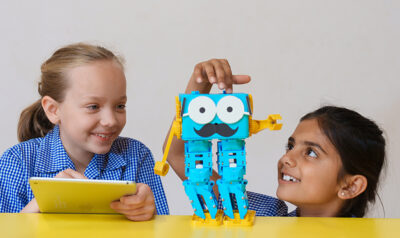Curriculum
Our Junior School Academic Curriculum
We pride ourselves on creating an environment where your child loves to learn.
Our personalised approach achieved through smaller classes and expertise in teaching girls means each child can thrive academically and personally.
We balance the necessary formal approach to learning needed for children to have a secure grounding in the key building blocks for literacy and numeracy with opportunities for active, purposeful learning woven into our school day. We assess and track pupil learning carefully through each term, especially in literacy and numeracy, so that we can be confident that the children are making the progress we expect at every stage.

Our curriculum is designed with an active approach to learning, prioritising STEM, digital skills, and leadership development. We embrace collaborative lesson planning and success criteria, shared and tailored to each student, which helps our pupils feel more connected to their learning journey. This student-led learning not only enhances their enjoyment of school but also builds confidence and independence.
As our children progress through primary their timetable enables a breadth of lessons covering not only core learning in literacy and numeracy but also subject specialists in Music, PE, Art, and Languages enriching our primary curriculum.
We employ teachers with strong educational histories themselves and as a Junior School team, we bring expertise across many areas of learning.
For our classes in the lower primaries, we have a dedicated classroom assistant working alongside the class teacher so that the learning of all children is supported both individually and also within a group setting.
A Strong Pupil Voice
The pupil voice in the Junior School is firmly embedded in the school.
Building on the success of our pupil-led clubs, our commitment to pupil voice extends beyond these activities, ensuring students have a say in various aspects of school life. Every pupil in our Junior School is part of a committee, such as the Eco Council, Health, Charities, Junior Librarians, Junior Road Safety Officers (JRSO) and Pupil Council. This ensures that children actively contribute to the school environment and decision-making processes.
We also conduct one-to-one learning conversations, where pupils discuss their learning experiences, share their thoughts, and provide feedback. "That is probably the tool that we find to be the most empowering for the girls, and lots of ideas have come out of those conversations that we have then been able to put into practice."


Curriculum Structure
Encouraging a Lifelong Love for Reading in Junior School
The Role of the Junior School Librarian
St George’s Junior School's library is a dynamic environment for inspiration, creativity, and fun. Leading this vital space is Brette Phebus, the Junior School Librarian, whose passion for inspiring a love of reading has transformed the lives of many students. Originally from the United States, Brette brings a wealth of experience, holding degrees in Early Childhood Education and Library Sciences. Her journey to St George’s began with a placement during her master’s studies at the University of Strathclyde, and she has been inspiring young readers here ever since.
"World Book Day is the best day ever. Last year, I dressed up as the Snow Queen from Narnia. I loved dressing up as a character from my favourite book and seeing what everyone else came as. This year, I’m thinking about being Alice from Alice in Wonderland." P5 pupil*














